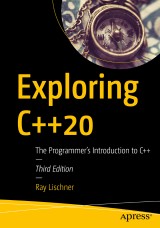Details

Exploring C++20
The Programmer's Introduction to C++3rd ed.
|
84,99 € |
|
| Verlag: | Apress |
| Format: | |
| Veröffentl.: | 27.08.2020 |
| ISBN/EAN: | 9781484259610 |
| Sprache: | englisch |
Dieses eBook enthält ein Wasserzeichen.
Beschreibungen
<p>Discover everything you need to know about C++ in a logical progression of small lessons that you can work through as quickly or as slowly as you need. This book divides C++ up into bite-sized chunks that will help you learn the language one step at a time. Fully updated to include C++20, it assumes no familiarity with C++ or any other C-based language. </p><p><i>Exploring C++20</i><i> </i>acknowledges that C++ can be a complicated language, so rather than baffle you with complex chapters explaining functions, classes, and statements in isolation you’ll focus on how to achieve results. By learning a little bit of this and a little of that you’ll soon have amassed enough knowledge to be writing non-trivial programs and will have built a solid foundation of experience that puts those previously baffling concepts into context.</p><p>In this fully-revised third edition of <i>Exploring C++</i>, you’ll learn how to use the standard library early in the book. Next, you’ll work with operators, objects, and data-sources in increasingly realistic situations. Finally, you’ll start putting the pieces together to create sophisticated programs of your own design confident that you’ve built a firm base of experience from which to grow.</p><p><b>What You Will Learn</b></p><ul> <li>Grasp the basics, including compound statements, modules, and more</li> Work with custom types and see how to use them <li>Write useful algorithms, functions, and more</li><li>Discover the latest C++ 20 features, including concepts, modules, and ranges<br></li> <li>Apply your skills to projects that include a fixed-point numbers and body-mass index applications</li> Carry out generic programming and apply it in a practical project <li>Exploit multiple inheritance, traits/policies, overloaded functions, and metaprogramming</li> </ul><p><b>Who This Book Is For</b></p>Experienced programmers who may have little or no experience with C++ who want an accelerated learning guide to C++20 so they can hit the ground running. <p></p><p> </p><p> </p><p></p>
<div>Part I: The Basics.-1. Honing your tools.- 2. Reading C++ Code.- 3. Integer Expressions.- 4. Strings.- 5. Simple Input.- 6. Error Messages.- 7. For Loops.- 8. Formatted Output.- 9. Arrays and Vectors.- 10. Algorithms and Ranges.- 11. Increment and Decrement.- 12. Conditions and Logic.- 13. Compound Statements.- 14. Introduction to File I/O.- 15. The Map Data Structure.- 16. Type Synonyms.- 17. Characters.- 18. Character Categories.- 19. Case-Folding.- 20. Writing Functions.- 21. Function Arguments.- 22. Using Ranges.- 23. Using Iterators.- 24. Unnamed Functioins.- 25. Overloading Function Names.- 26. Big and Little Numbers.- 27. Very Big and Very Little Numbers.- 28. Documentation.- 29. Project 1: Body-Mass IndexPart II: Custom Types.- 30. Custom Types.- 31. Overloading Operators.- 32. Custom I/O Operators.- 33. Assignmentand Initialization.- 34. Writing Classes.- 35. More About Member Functions.- 36. Access Levels.- 37. Understanding Object-Oriented Programming.- 38. Inheritance.- 39. Virtual Functions.- 40. Classes and Types.- 41. Declarations and Definitions.- 42. Modules.- 43. Old-Fashioned "Modules".- 44. Function Objects.- 45. Useful Algorithms.- 46. More About Iterators.- 47. Ranges, Views and Adaptors.- 48. Exceptions.- 49. More Operators.- 50. Project 2: Fixed-Point Numbers.- Part III: Generic Programming.- 51. Function Templates.- 52. Class Templates.- 53. Template Specialization.- 54. Partial Template Specialization.- 55. Template Constraints.- 56. Names and Namespaces.- 57. Containers.- 58. Locales and Facets.- 59. International Characters.- 60. TextI/O.- 61. Project3: Currency Type.- Part IV: Real Programming.- 62. Pointers.- 63. Regular Expressions.- 64. Moving Data with Rvalue References.- 65. Smart Pointers.- 66. Files and File Names.- 67. Working with Bits.- 68. Enumerations.- 69. Multiple Inheritance.- 70. Concepts, Traits and Policies.- 71. Names, Namespaces, and Templates.- 72. Overloaded Functions and Operators.- 73. Programming at Compile Time.- 74. Project 4: Calculator.</div>
Ray Lischner has a bachelor's degree in computer science from Caltech and a master's in computer science from Oregon State University. He worked as a software developer for a dozen years, at big and small companies across the US, using PL/I, C, C++, Delphi, Smalltalk, and various assembly languages on both large and small systems. He has been self-employed as a consultant, trainer, and author for the last ten years. Ray taught computer science at Oregon State University for several years and specialized in teaching introductory computer programming. He taught courses in C and C++ and software engineering.
<p>Discover everything you need to know about C++ in a logical progression of small lessons that you can work through as quickly or as slowly as you need. This book divides C++ up into bite-sized chunks that will help you learn the language one step at a time. Fully updated to include C++20, it assumes no familiarity with C++ or any other C-based language.</p><p><i>Exploring C++20</i><i> </i>acknowledges that C++ can be a complicated language, so rather than baffle you with complex chapters explaining functions, classes, and statements in isolation you’ll focus on how to achieve results. By learning a little bit of this and a little of that you’ll soon have amassed enough knowledge to be writing non-trivial programs and will have built a solid foundation of experience that puts those previously baffling concepts into context.</p><p>In this fully-revised second edition of <i>Exploring C++</i>, you’ll learn how to use the standard library early in the book. Next, you’ll work with operators, objects, and data-sources in increasingly realistic situations. Finally, you’ll start putting the pieces together to create sophisticated programs of your own design confident that you’ve built a firm base of experience from which to grow.</p><p>You will:<b></b></p><ul><li>Grasp the basics, including compound statements, modules, and more</li><li>Work with custom types and see how to use them</li><li>Write useful algorithms, functions, and more</li><li>Apply your skills to projects that include a fixed-point numbers and body-mass index applications</li><li>Carry out generic programming and apply it in a practical project</li><li>Exploit multiple inheritance, traits/policies, overloaded functions, and metaprogramming</li></ul>
Includes bite-sized chunks that will help you learn the language one step at a time Builds up from first principles with C++20 included Shows how to create sophisticated C++ applications of your own

















